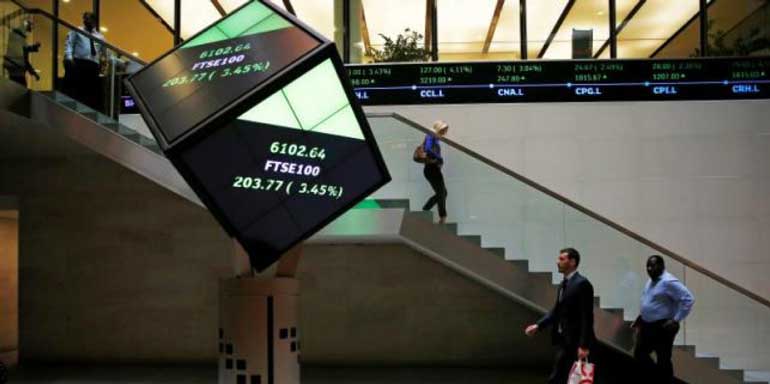Thursday Feb 19, 2026
Thursday Feb 19, 2026
Saturday, 21 November 2015 00:00 - - {{hitsCtrl.values.hits}}

Reuters: Asian shares edged higher on Friday, while the dollar took a breather after stepping back from seven-month highs as investors grappled with the prospects of higher US borrowing costs and slower global economic growth.
Commodity prices were pressured, with copper near 6-1/2-year lows and a major sea freight index hitting its lowest level on record, underscoring worries over slackening world demand.
European shares are seen slipping slightly a day after the Pan-European stock index hit a three month high, with spreadbetters expecting Germany’s DAX to fall 0.3% and France’s CAC 40 0.2%.
MSCI’s broadest index of Asia-Pacific shares outside Japan rose 0.4%, extending this week’s gains to 2.0% while Japan’s Nikkei edged up 0.1%, posting its fifth consecutive week of gains.
Mainland Chinese shares also held firm, with Shanghai composite up 0.2% to stay near a three-month high struck on Tuesday.
“Share prices are boosted by ample liquidity. Chinese authorities are desperate to support share prices while the European Central Bank has also clearly indicated an easing in December,” said Norihiro Fujito, senior investment strategist at Mitsubishi UFJ Morgan Stanley Securities.
“People who sold shares in the summer on concerns about a slowdown in China are buying back. But they are turning a blind eye to the poor state of economic fundamentals,” he said.
For example, copper - seen as a good gauge of the global economy because of its wide industrial use - has been hit by persistent worries that supply cuts won’t be enough to offset the pressure on prices caused by weak demand in top user China.
It slumped to a 6-1/2-year low of $4,573.50 per ton on Thursday before bouncing back to $4,643.00, still down 3.8% so far this week.
The Baltic Index, which tracks rates for ships carrying dry bulk commodities and is viewed as a good reflection of the health of world trade, fell to a record low, having fallen 58.8% from its peak this year.
“Many economies in Asia and emerging markets are still not doing that good. Demand for raw materials remain very weak,” said Masahiro Ichikawa, senior strategist at Sumitomo Mitsui Asset Management.
Oil prices were also not far from near three-month lows hit earlier this week.
Global benchmark Brent futures last stood at $44.27 per barrel, compared to Monday’s low of $43.15.
The dollar licked wounds after having weakened across the board on Thursday following four straight sessions of gains, as investors took profits after the gains driven by widespread expectations of a U.S. Federal Reserve interest rate increase next month.
The dollar index stepped back from Wednesday’s seven-month high of 99.853 to stand at 99.061.
The euro bounced back to $1.0720 after having hit a seven-month low of from $1.0617 on Wednesday. The dollar slipped to 122.82 yen from Wednesday’s three-month high of 123.77.
Position unwinding was most notable against some of the Asian currencies that had been heavily sold earlier this year. The Malaysian ringgit rose 1.8% while the Indonesian rupiah gained 1.1%.
Long-dated U.S. debt yields also dipped, with the 30-year yield hitting a two-week low of 2.988% on Thursday. It last stood at 3.017%.
At the shorter end, money market futures continue to price in around a 70% chance of a rate hike by the Fed in December, based on the assumption that the Fed Fund rate will trade around 0.375% after the Fed lifts the target range to 0.25-0.50%.
Many market players think the Fed is almost certain to raise interest rates next month for the first time in almost a decade.
Fed Vice Chairman Stanley Fischer said on Thursday the Federal Reserve has telegraphed its imminent interest rate hike so well that central bankers elsewhere have even begun to get impatient about it.
“In the relatively near future probably some major central banks will begin gradually moving away from near-zero interest rates,” Fischer also told the San Francisco Fed’s biannual Asia Economic Policy conference.